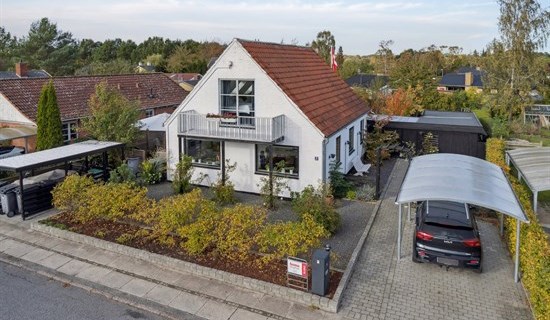BEMÆRK: Ansøgningsfristen er overskredet
Novo Nordisk Foundation Center for Basic Metabolic Research
Faculty of Health and Medical Sciences
University of Copenhagen
The University of Copenhagen is seeking a highly motivated and talented Postdoc fellow to commence on January 1, 2024, at the Novo Nordisk Foundation Center for Basic Metabolic Research (CBMR), University of Copenhagen.
About us
The Novo Nordisk Foundation Center for Basic Metabolic Research’s vision is to strengthen interdisciplinary research that transforms our basic understanding of the mechanisms that underlie cardiometabolic health and disease, and to accelerate this knowledge toward new prevention and treatment strategies. We were established in 2010, and in 2017, we moved into new laboratories and offices in the Maersk Tower.
The Center has around 260 employees who work in an international, highly collaborative research environment across a range of biomedical disciplines. For more information, visit www.cbmr.ku.dk.
Our research
The successful candidate will be supervised by Prof. Juleen R. Zierath. The Zierath Group investigates the interactions between intrinsic biorhythms and external perturbations such as exercise and nutrient provision to identify novel translational strategies for prevention and treatment of metabolic disease: https://cbmr.ku.dk/research/integrative-metabolism-and-environmental-influences/zierath-group/. The group is highly collaborative and interdisciplinary, with established expertise in transcriptomics, proteomics, bioinformatics, and metabolic phenotyping across a range of experimental models (cells, rodents, and humans).
Job description
Circadian rhythms are driven by an internal biological clock that is synchronized by Zeitgebers (timekeepers) that anticipate day/night cycles to optimize the physiology and behaviour of organisms. The circadian program is regulated at both a central and peripheral level, and cell autonomous circadian rhythms are generated by a transcriptional auto-regulatory feedback loop. A basic paradigm of circadian regulation of metabolism is that oscillations of gene expression generate daily rhythms in cellular metabolism. While disrupted circadian rhythms alter metabolism, the extent to which these processes are impaired in humans with obesity or type 2 diabetes is unknown.
The main objectives of this post-doctoral project are to elucidate the interplay between energy sensing pathways (predominantly AMPK) and the circadian clock to regulate systemic metabolism. To understand the impact of AMPK on circadian biology, skeletal muscle-specific AMPKG3 knockout and AMPKG3 transgenic mice, and respective wild-type mice, will be studied. Mice will be studied across a 12h:12h light:dark cycle to characterize the role of AMPK in regulating circadian metabolism. The role of AMPK in regulating mitochondrial rhythmicity will be investigated by crossing mito-QC mice with AMPKG3 knockout and transgenic mice, and studying mitochondrial respiration, mitophagy, and mitochondrial content across the circadian cycle. Finally, we will determine the role of skeletal muscle AMPK in the circadian response to energetic stressors via timed exercise and fasting in AMPKG3 knockout and transgenic mice.
The postdoctoral fellow will adopt multi-disciplinary approaches, integrating cell-based systems and animal models to investigate the interplay between energy sensing and the circadian clock to regulate metabolism. This project will include usage of transgenic mouse models, mitochondrial respirometry, microscopy, and omics analyses, and the successful candidate will therefore receive necessary basic training within these fields. Proteomics studies will be carried out in collaboration with the Deshmukh Group at CBMR.
Profile
The Postdoc fellowship is aimed at early-career researchers with a basic science background or clinicians who aspire to a career in academic medicine. We are particularly interested in candidates who are familiar with integrative research approaches within the broad area of basic cardiometabolic research with an application toward human pathophysiology.
Required qualifications:
- PhD in Biology, Biochemistry, Molecular Biology, Molecular Biomedicine, or related sciences
- Knowledge of mitochondrial respiration, mammalian metabolism and circadian biology
- Documented experience with animal handling
- Demonstrated experience with mammalian tissue culture techniques and biochemical assays
- The candidate should be able to work independently and interactively in a team setting, and be enthusiastic, motivated and proactive
- Enthusiasm to collaborate across research groups with diverse technical expertise
- Excellent English communication skills, both written and oral
The Postdoc fellowships are open for applicants that hold a PhD degree obtained before January 1, 2024.
Terms of employment
The employment as Postdoc is a full-time position for 3 years. Starting date is January 1, 2024.
Salary, pension, and terms of employment will be in accordance with the agreement between the Danish Ministry of Finance and AC (Danish Confederation of Professional Associations). Depending on qualifications, a supplement may be negotiated.
Non-Danish and Danish applicants may be eligible for tax reductions if they hold a PhD degree and have not lived in Denmark for the last 10 years.
The position is covered by the Job Structure for Academic Staff at Universities 2020.
Questions
For further information about the position, please contact Professor Juleen R. Zierath at juleen.zierath@sund.ku.dk. For questions regarding the recruitment procedure, please contact HR at sund-hr-cbmr@sund.ku.dk.
The University of Copenhagen International Staff Mobility office offers support and assistance to all international researchers on all issues related to moving to and settling in Denmark.
Application procedure
Your online application must be submitted in English via the ‘Apply now’ link below. Furthermore, your application must include the following documents/attachments – all in PDF format:
- Cover letter expressing the motivation and previous research experience of the applicant (max. one page)
- Curriculum vitae
- Copy of the PhD degree certificate and the master’s degree certificate. In case the PhD has not yet been completed, a written statement from the supervisor is acceptable, confirming it will be obtained before January 1, 2024.
- List of publications
- References (name and contact details of at least two references)
We reserve the right not to consider material received after the deadline and not to consider applications that do not live up to the abovementioned requirements.
The further process
After the expiry of the deadline for applications, the authorized recruitment manager selects applicants for assessment on the advice of the hiring committee. All applicants are then immediately notified whether their application has been passed for assessment by an unbiased assessor. Once the assessment work has been completed, each applicant can comment on the part of the assessment that relates to the applicant him/herself.
You can read about the recruitment process at www.employment.ku.dk/faculty/recruitment-process.
The applicant will be assessed according to Ministerial Order No. 242 of March 13, 2012, on the Appointment of Academic Staff at Universities.
The University of Copenhagen wishes to reflect the diversity of society and welcomes applications from all qualified candidates regardless of their personal backgrounds.
INFORMATIONER OM STILLINGEN:
- Arbejdspladsen ligger i:
Ballerup Kommune
-Virksomheden tilbyder:
-Arbejdsgiver:
KU-SUND-Metabolismecentret, Nørre Allé 20, 2200 København N
-Ansøgning:
Ansøgningsfrist: 18-06-2023; - ansøgningsfristen er overskredet
Ved skriftlig henvendelse: https://candidate.hr-manager.net/ApplicationInit.aspx?cid=1307&ProjectId=159256&DepartmentId=19212&MediaId=4632&SkipAdvertisement=true
Se mere her: https://job.jobnet.dk/find-job/5835051





